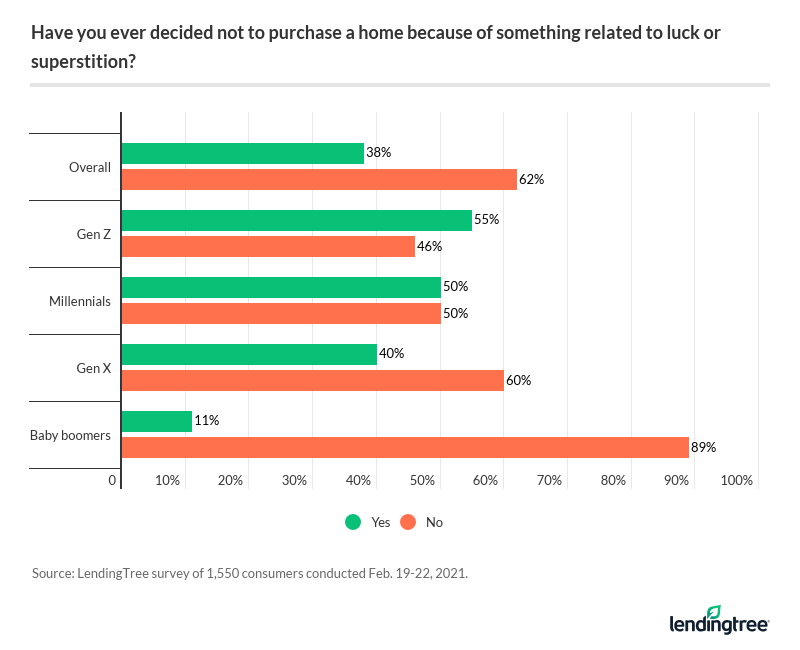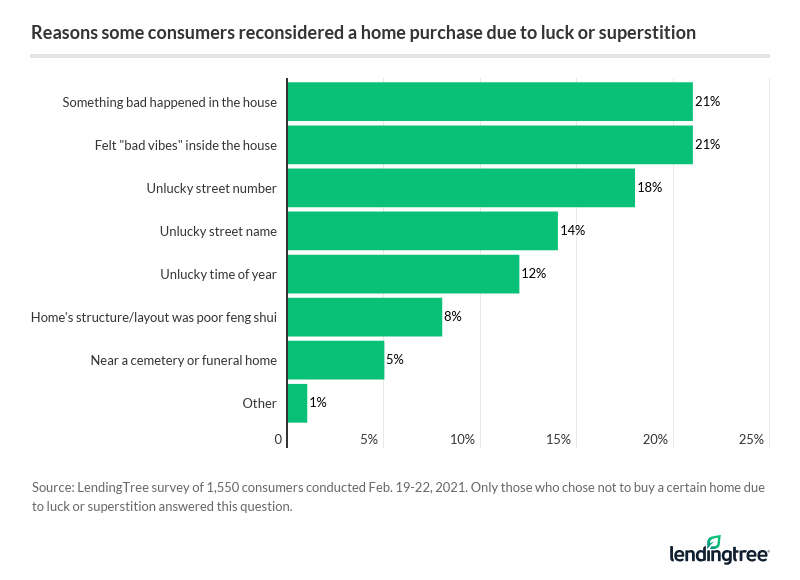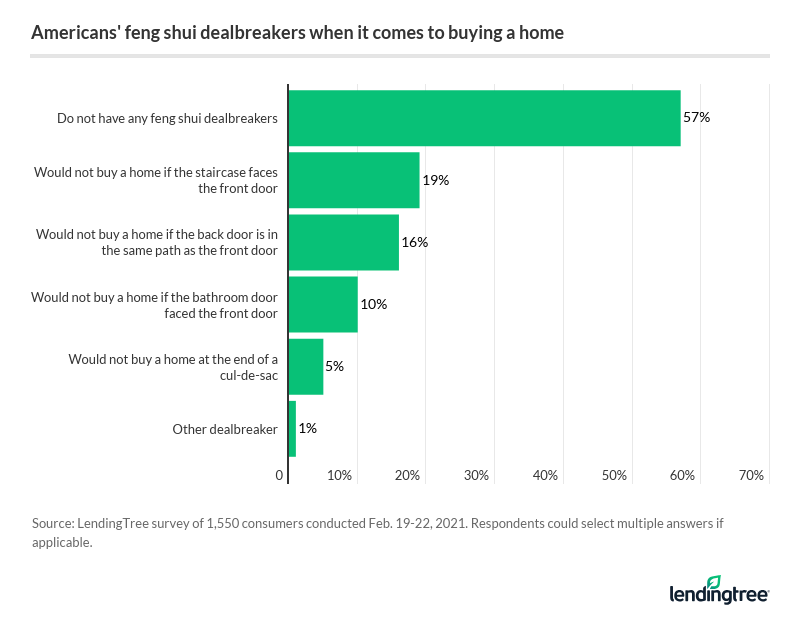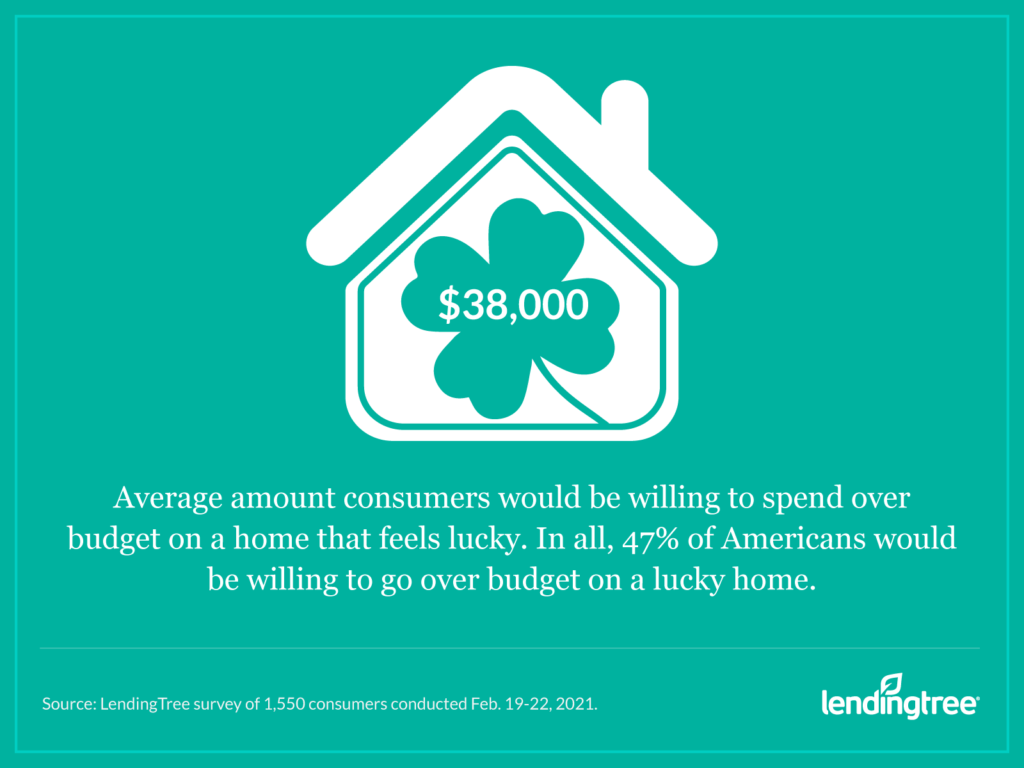Nearly Half of Americans Would Burst Their Budget for a ‘Lucky’ Home
Would you buy a home on Elm Street? Or pay extra for a home that had your lucky number attached to the mailbox out front? Turns out, some homeowners have said yes to these questions.
A new LendingTree survey finds that many Americans may let luck or superstition influence their homebuying behaviors. In fact, nearly 4 in 10 said “I’ll pass” on a home, and had a superstitious explanation for their decision.
Key findings
- More than a third (38%) of Americans have decided against buying a home because of a superstition. Men are more likely than women — 51% versus 27%, respectively — to skip out on a home purchase for superstitious reasons.
- Nearly 4 in 10 (39%) homebuyers refuse to live next to a cemetery. Another 32% would skip out on buying a home with an unlucky street number, and 30% wouldn’t buy a house if the previous owners experienced a tragedy, such as death.
- Almost half (47%) of homebuyers would ignore their budget for a “lucky” house. On average, survey respondents are willing to go at least $38,000 above their target home price.
More than a third have avoided a home purchase due to superstition
When asked if they’ve ever decided not to buy a particular home because of something luck-related or superstitious, 38% of homebuyers said they’ve done so at least once. Meanwhile, 62% said they’ve never skipped out on a home purchase based on bad luck or superstition.

Broken down by generation, younger adults are more likely to decide against buying a home because of luck or superstition. More than half (55%) of Generation Z and 50% of millennials have avoided a particular property.
Nearly 9 in 10 (89%) survey respondents who consider themselves “very superstitious” have opted out of a home purchase because of a superstition or an unlucky feeling.
Of those who skipped buying a home because of a superstition, the top three most-cited reasons were:
- I learned something bad happened in the home: 21%
- I felt “bad vibes” when inside the home: 21%
- I noticed the home has an unlucky street number: 18%

Nearly 4 in 10 buyers would rather not live next to do the dearly departed
Our survey data show that 39% of homebuyers wouldn’t ever buy a home that was situated next to a cemetery. On the flip side, 61% of buyers would live next to a cemetery. Of that group, nearly a quarter (24%) would expect to buy the house at a discounted price.
More than 4 in 10 (43%) homebuyers have at least one deal breaker related to a home’s feng shui. Common reasons for not buying a home include:
- The staircase faces the front door: 19%
- The back and front doors are in the same path: 16%
- The bathroom door faces the front door: 10%

More than 4 in 10 (43%) survey respondents who reported being previous home sellers said they have had difficulties selling their home, thanks to superstitious buyers.
To illustrate how superstitions can impact homebuying habits, we asked a series of hypotheticals. For example, when asked whether they would ever live on Elm Street, more than two-thirds (71%) said yes, but 1 in 5 (20%) would expect a price reduction when purchasing a home that may or may not get the occasional visit from Freddy Krueger.
Nearly 7 in 10 (69%) survey respondents would buy a house with an unlucky street number — such as 13 or 666 — but 20% of those buyers would prefer to pay less because of this numeric superstition.
About half of buyers would go over budget for a ‘lucky’ home
A large chunk of survey respondents — 47% — are willing to disregard their homebuying budget for a house that feels lucky. By how much, you ask? About $38,000, on average.

More than a third (35%) of buyers would pay extra for a home whose street number was their lucky number.
When asked if they have specific rituals they follow when moving into a new home to cleanse it of bad energy and prepare the property for their family, half of buyers agreed — 24% said this describes them completely and 26% said this somewhat describes them.
Methodology
For this survey, LendingTree commissioned Qualtrics, an experience management firm, to field an online survey of 1,550 Americans. The survey was conducted Feb. 19-22, 2021, using a non-probability-based sample and quotas to ensure the sample base was proportioned to represent the overall population. Researchers reviewed all responses for quality control.
We used the following age ranges to define generations in 2021:
- Generation Z: 18 to 24
- Millennials: 25 to 40
- Generation X: 41 to 55
- Baby boomers: 56 to 75
The survey also included consumers from the silent generation (ages 76 and older). Due to the small sample size, however, findings related to that group were excluded in the generational breakdowns.
View mortgage loan offers from up to 5 lenders in minutes

